________________
<4>. TIME and SPACE - Real and Relative
A. R. Prasanna, Ph. D. (Physics)
Senior Professor, Physical Research Laboratory, Ahmedabad
Email:
[email protected],
[email protected]
In the context of discussions on Consciousness, the question which has been often raised is about the role of Space and Time for body, mind and soul. Before going into the intricacies of these concepts,let us briefly try and understand the enigma of Time, purely from a scientific perspective.
The often raised questions about time are, is it real? is it reversible? can one travel back in time? Are the Physical laws eternal? In the following an attempt is made to raise the fundamental question of what Time is understood to be in Science, and how it is incorporated in the analysis of events in the Universe we are aware of.
The subjectivity of Time endorses the observer's limitations in drawing conclusions about the laws of Nature. The arrow of Time is a reality which tells us about what one means by progress in understanding of Nature and its laws, which may or may not be eternal.
Time, the most enigmatic of all concepts, perceived by the human mind is as elusive for definition, as its role in our lives. Our perception of time depends upon the change we notice, the change that happens at the same location. As one knows that there is nothing fixed in space, the same means point of location to fixed to itself, thus implying that the change one refers to is purely subjective. The events of experience, recorded as an ordered sequence, past, present and future, defines the notion of time. With this proviso, an objective definition of time may not be practicable.
While Newton considered time as an absolute entity, as something without relation to anything external, he also defined the notion of "duration" calling it common time, which helped him in defining the laws of motion, which involved the rate of change of position of a body. It is ironical that though Newton had accepted the notion of relative motion, he did not see the consequence of this on the measurement of duration, which Einstein later clarified and reduced the role of time from its pedestal and gave it the same status as that of space combining the
